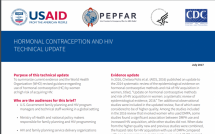Hormonal Contraception and HIV – Technical Update
This update summarizes current evidence and the World Health Organization (WHO) revised guidance regarding the use of hormonal contraception (HC) by women at high risk of acquiring HIV.
The update lists the following guidance:
Women at high risk of HIV should not be restricted from using progestogen-only injectables.
All women who choose to use progestogen-only injectables (DMPA-IM, DMPA-SC and NET-EN) should be advised on the potential increased risk of HIV acquisition.
Women who seek family planning services should receive HIV prevention information and be advised that dual method use (condoms plus an effective contraceptive method) is the best option to prevent both sexually transmitted infection (STI)/HIV acquisition and unintended pregnancy. All women who choose to use contraceptive method
Every effort should be made to ensure that women and couples have access to a wide range of contraceptive methods through voluntary family planning services and are able to make a free and informed choice of the method that best fits their individual needs and life situation, including their HIV acquisition risk.
Last modified: March 25, 2019
Language: English

